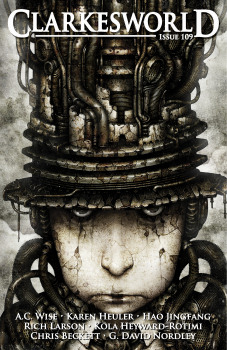 Clarksworld #109, October 2015
Clarksworld #109, October 2015
“And If the Body Were Not the Soul” by A. C. Wise
Reviewed by Rick Cartwright
In “And if the Body were not the Soul” A. C. Wise seems to be attempting to trace the journey of a broken person to healing via aliens. He failed. The setting is an Earth ghetto where the aliens have restricted themselves. This is not the trope of alien refugees, cut off and dependent on the inhabitants of their new home. No, this is a group of visitors who have regular contact with their homeworld who apparently choose to live in squalor separate from a somewhat hostile human city. At first, you are rooting for the protagonist Ro to overcome her disability, and become a bridge. The ending left me both disappointed and perturbed, because nothing is truly resolved and my suspension of disbelief was torn out by the roots.
“Ice” by Rich Larson is both a coming of age story and a tale of brothers who have a gulf that the family connection can no longer bridge. The setting is a frigid, remote mining town on another planet. Like most remote places that have teenagers, the teenagers are always looking for something to do. The more boneheaded and dangerous the better. Anyone who has ever had a sibling can relate to the rivalry where one sibling is faster, stronger, and more resilient and the other wants to prove they are just as good. Throw in genetic modification and a hostile alien environment, and it gets very interesting.
I read “Father” by Kola Heyward-Rotimi several times. It is set in a time of religious conflict on a space station and the main character is sent to retrieve a religious icon. There is a lot of death and violence. I could neither figure out the point of the story or particularly care about it. Your mileage may vary.
“Egg Island” by Karen Heuler is an excellent tale of “what if.” She describes a world where human ingenuity takes the problem of ocean garbage and turns it into something useful. “Egg Island” is by no means a hard science fiction story, but if you can ignore the somewhat questionable biology, then you will be both entertained and uplifted by the positive and hopeful ending.
“Summer at Grandma’s House” by Hao Jingfang is…odd. Not bad mind you, but it’s like reading any translation, you get the subtle feeling you are missing something. On its face, it is a story about a young person who doesn’t know what to do with her life, has had a breakup and goes to stay with her elderly grandmother for the summer. A grandmother who apparently does genetic modifications from her home, which is not what it seems. As you get into the story itself, you wonder what the author is trying to do as the tale tends to wander a bit. That said, I think this is more of an issue with Chinese and American cultural expectations that any defect in the story, as Hao Jingfang brings it home with an unexpected and satisfying conclusion.